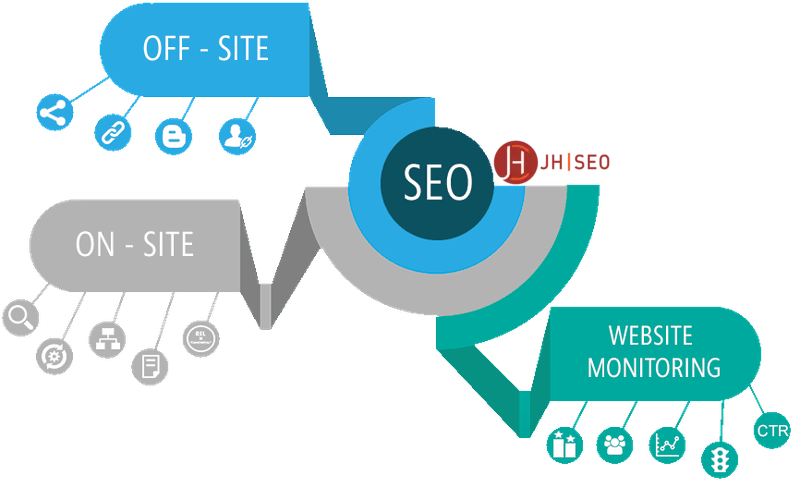In the vast expanse of digital marketing, one term stands out, not just for its ubiquity and necessity, but for the sheer depth and complexity it represents. SEO – Search Engine Optimization. It’s not just another digital marketing jargon, it’s the heartbeat of any successful online presence, but often misunderstood and shrouded in mystery for many.
Defining SEO: What It Is and Why It Matters
SEO 101: A Beginner's Guide
Search Engine Optimization (SEO) refers to the process of enhancing a website’s visibility in search engine results pages (SERPs) with the ultimate goal of attracting more organic (non-paid) traffic. SEO, when done right, can catapult a business from the shadows of the internet to the spotlight. It’s the sweet science of understanding what people are searching for online, the answers they seek, the words they’re using, and the type of content they wish to consume.
SEO: A Cornerstone of Online Presence
For businesses today, SEO is a non-negotiable element. It acts as a bridge between what people are searching for and the solutions your business provides. Without it, businesses might find themselves in a never-ending digital desert, hoping to be stumbled upon but rarely seen.
Organic vs. Paid: Navigating the Dynamic Search Landscape
Understanding the Organic Search Ecosystem
Organic search results are listings on a search engine results page that appear because of their relevance to the search terms, as opposed to being advertisements. This distinction means that organic results are based on SEO-driven content, and users generally consider these more trustworthy and valuable.
The Paid Terrain: Search Engine Marketing
Contrastingly, paid search results are the outcomes of online advertisements through platforms like Google Ads. They are distinct from organic search results and appear at the top or bottom of the page, marked as ‘Ad’. While they involve SEO principles, paid search—also known as SEM—requires a different approach, focusing on bidding on keywords to ensure the ad visibility.
Unveiling the SEO Lexicon: Common Terms and Concepts
Keywords: The Building Blocks of SEO
Keywords are the words and phrases that users enter into search engines. They act as the connecting thread between a user’s intent and a website’s content. Keyword research, the process of identifying these terms, becomes pivotal in crafting an SEO strategy that resonates with a target audience.
On-Page Optimization: Enhancing Digital Real Estate
On-page SEO involves optimizing individual web pages to rank higher and earn more relevant traffic. This often includes elements of the webpage, like HTML code, textual content, and images. It focuses on technical maneuvers that seek to make the page more attractive to search engine algorithms while still being user-friendly.
Off-Page SEO: The Reputation Management
Off-Page SEO factors exist outside of the website, typically regarding how the site is perceived by search engines and users. This includes backlink building, social media marketing, and influencer collaborations. These signals serve as endorsements for the content’s authority and usefulness.
Local SEO: Navigating the Neighborhood of Search
For businesses with a physical location or serving a specific geographical area, local SEO is a game-changer. It ensures that when people search for services or products “near me,” they find you. This can involve creating profiles on local listing sites, reviews, and localized content.
Technical SEO: The Underlying Web Work
This aspect deals with the non-content elements of your website, such as site speed, mobile-friendliness, indexing, crawlability, site architecture, and structured data. It’s the foundation that ensures search engines can access, interpret, and index your content without a hitch.
The Road Ahead: Your Next SEO Steps
Educate Yourself Continuously
SEO is not a static field. It transforms as the internet landscape shifts. Dedicate time to stay updated on the latest trends, updates, and best practices. Leverage resources like industry blogs, podcasts, and online courses to hone your skills.
Conduct An SEO Audit
An SEO audit is like taking your site’s health to the doctor, and you should perform it regularly. It’s a detailed analysis of the various elements of your website that affect its ranking in SERPs. From content quality to backlink profile, an SEO audit can reveal both strengths and areas for improvement.
Content Is Still King
With every search update, search engines like Google value high-quality, informative, and relevant content more. Ensure your website content is engaging and valuable to the user, not just search engines. Rich, well-structured content, along with strategic use of keywords, can significantly boost your SEO efforts.
Adapt To Mobile
A significant portion of searches happens on mobile devices. As such, search engines are prioritizing mobile-friendly designs. If your website is clunky on a smartphone, it’s not just a UX issue; it’s an SEO one, too.
Patience Is Key
SEO is a long-term strategy. Results won’t appear overnight, and you might not see the results of your efforts for a few months. Continue to focus on the fundamentals and be patient; organic growth, while slow, is often the most sustainable.
SEO might seem daunting, but it’s a discipline that rewards persistence and diligence. It’s ever-changing, challenging, and crucial to the survival and success of brands in an online world. By demystifying SEO with this comprehensive guide, you’ve taken your first step toward harnessing the power of search for your business. Now, it’s time to apply these insights and watch as your digital presence climbs the ranks.
The Ultimate Guide to Mastering Keyword Research for SEO
Your organic search rankings are the bread and butter of your digital presence. Understanding your audience’s search behavior is key to unlocking valuable traffic and ensuring your content gets in front of those who seek it. This comprehensive guide to keyword research will lead you through the realms of strategic word choice and help you carve a path to the first page of Google – where the magic truly happens.
Unveiling the Craft of Keyword Research
The term “keyword research” often conjures images of digital marketing gurus hunched over their laptops, performing some form of clandestine online alchemy. But what exactly is keyword research and why is it the foundational stone of any successful SEO strategy?
Why Keyword Research is the SEO Bedrock
Keyword research is the process of identifying the actual words and phrases people use in search engines. By understanding these terms, you can optimize your content in a way that helps search engines connect your website with the queries people are entering. It’s the decoding of a language that delivers customers right to your digital doorstep.
The Golden Rule: Quality Over Quantity
There was a time when SEO was about stuffing as many keywords as possible into your content, like a verbal game of Tetris. Today, it’s about intention – finding the right keywords that will attract the right kind of traffic.
Cutting-Edge Tools and Techniques for Keyword Research
The keyword research landscape is rich with tools that can uncover not just keywords, but insights into search volume, user intent, and even your competitors’ strategies. Here’s how to harness these tools for your own keyword gold rush.
Power Tools of the Trade
There is an arsenal of keyword research tools at your disposal. From the ubiquitous Google Keyword Planner to the more sophisticated SEMrush and Ahrefs, each tool offers its unique lens into the world of search terms. We’ll explore the top contenders and how they can supercharge your keyword research.
Techniques for a Deeper Dig
Keyword research is not a one-size-fits-all process. Depending on your industry, target audience, and the stage of your website, your approach will vary. We’ll uncover advanced techniques such as semantic search expansion and competitor keyword analysis that will give you an edge in your niche.
Identifying High-Value Keywords for Your Website
Not all keywords are created equal. Some have the potential to drive a flood of traffic to your site, while others might simply add to the internet noise. It’s crucial to identify high-value keywords that align with your business goals.
The Art of Judging Keyword Value
Discover the metrics that matter, from search volume to keyword difficulty. Learn how to find keywords that have the potential to convert as well as those that can help you capture valuable real estate on the search engine results page (SERP).
Forecasting Performance with Keyword Insights
Once you’ve identified potential keywords, it’s important to use data to make informed decisions. Understanding keyword trends, seasonality, and the competitive landscape can give you a forecast for the performance of each keyword on your list.
Navigating the Long-Tail vs. Short-Tail Keywords Debate
Every SEO professional has an opinion on the long-tail vs. short-tail keywords debate. We’ll explore the advantages of each and the scenarios where one might take precedence over the other.
The Long and Short of It: Defining Each Type
Short-tail keywords are typically one to three words in length and are often high in search volume but also high in competition. Long-tail keywords are longer phrases that are specific to what your audience is looking for and tend to have lower search volume and less competition.
When to Use Long-Tail and Short-Tail Keywords
The choice between long-tail and short-tail keywords isn’t an either/or proposition. We’ll discuss how each type of keyword can be used strategically to target different stages of the customer journey and how they can work together to maximize your SEO efforts.
Keyword Research Beyond Google: Exploring Other Search Engines
We often think of keyword research as a Google-centric activity, but other search engines have their own rich data sets waiting to be mined. Discover how to approach keyword research on platforms like Amazon, YouTube, and more.
Adapting to a Multi-Platform Environment
Each search engine has its own user base and search behavior, which means their keywords can differ significantly. We’ll cover how to perform keyword research on non-Google platforms, what to look for, and how to integrate these keywords into your SEO strategy.
Unique Keyword Opportunities on Different Platforms
From voice search to specialized e-commerce queries, different platforms offer unique keyword opportunities. You’ll learn how to identify these opportunities and take advantage of them to reach a broader audience.
The Future of Keyword Research: Voice Search and Beyond
The keyword research process is not immune to the winds of change. As voice search and AI-driven tools become more common, the way people search is evolving. What does this mean for the future of keyword research, and how can you stay ahead?
Preparing for a Voice-First World
With virtual assistants like Google Home and Amazon Echo, voice search is no longer the stuff of science fiction. We’ll discuss how to optimize for natural language, understanding conversational queries, and the impact these changes have on keyword research.
The Role of AI in Keyword Discovery
AI and machine learning are revolutionizing the keyword research process. We’ll explore how these technologies can uncover hidden patterns in search behavior, predict keyword performance, and even suggest the next word or phrase that should pepper your content.
Winning with Keywords
Keyword research in SEO is not just a one-time event; it’s an ongoing process of discovery, testing, and adaptation. By mastering the art of keyword research, you position yourself to win the battle for visibility and traffic in the ever-competitive online marketplace.
Remember, the key to keyword research is not just finding the words and phrases that describe your business but also understanding the intent behind those words. This guide equips you with the knowledge and tools to excel in this pivotal aspect of SEO, and as you put these strategies into practice, you’ll find that the right keywords have the power to transform your online presence. It’s time to launch your odyssey through the lexical labyrinth and emerge victorious in the world of search engine rankings.
On-Page SEO Strategies
On-page SEO is the practice of optimizing individual web pages to improve their search engine rankings and attract relevant traffic. Here are the core components of successful on-page SEO:
Content Optimization
High-quality, relevant, and engaging content is at the heart of on-page SEO. To optimize effectively, begin with comprehensive keyword research to understand the language your audience uses to search for information. Embed these keywords naturally within your content, focusing on content depth and breadth, as well as the latest user search intent.
Think beyond text – visuals, videos, and interactive elements not only enhance user experience but also provide additional opportunities for keyword optimization. Remember, the goal is not just to rank for keywords but to provide value to your readers.
Meta Tags and Descriptions
Your page’s meta title and description serve as its virtual business card in search engine result pages (SERPs). Craft compelling meta titles of no more than 60 characters that include your primary keyword near the beginning. Descriptions should be informative, persuasive, and match search intent without exceeding 160 characters. Both tags should be unique to each page and invite the reader to click through.
URL Structure and Internal Linking
Your URL should be simple, descriptive, and include your target keyword. A clear URL structure makes it easier for search engines to parse your site’s content and improves user experience.
Internal linking is a powerful SEO tactic that distributes page authority throughout your site, helps users discover related content, and tells search engines which pages are most important. Use descriptive anchor text that includes relevant keywords to contextualize your links effectively.
Off-Page SEO Strategies
Off-page SEO revolves around improving the perception and authority of your domain through actions taken outside your website. While you have less direct control over these factors, the following strategies are under your influence:
Backlink Building
Backlinks – links from other websites to yours – are a vote of confidence in the quality and relevance of your content. Encouraging backlinks involves creating share-worthy content, outreach to relevant websites, and participating in industry forums and discussions.
Craft a backlink strategy that prioritizes the acquisition of high-quality, authoritative links. Tools like Moz’s Domain Authority can help you identify valuable linking opportunities.
Social Media Presence
While social media signals are not direct ranking factors, they impact SEO indirectly. Maintain a strong social media presence to increase brand awareness, drive traffic to your site, and foster a community around your content. Each social platform also offers unique SEO benefits – for instance, Pinterest can act as a search engine, and YouTube videos can rank on Google.
Guest Blogging and Influencer Collaborations
Contributing guest posts to other websites can extend your reach, build your brand, and earn backlinks. Be selective with platforms, ensuring they align with your brand and audience. Collaboration with influencers can bring credibility and additional traffic to your content.
Technical SEO Tactics
Technical SEO focuses on the architecture of your site, ensuring search engine crawlers can access and index your content without obstacles.
Site Speed Optimization
Site speed not only impacts user experience but is a vital SEO ranking factor. Utilize tools like Google’s PageSpeed Insights to identify and address speed issues. Techniques such as image optimization, reducing server response times, and leveraging browser caching can help improve load times.
Mobile-Friendliness
With a significant portion of web traffic coming from mobile devices, a mobile-friendly design is non-negotiable. Google’s mobile-first indexing means your site’s mobile version is the primary reference for both search engine rankings and visibility.
Adopt a responsive web design that adjusts the layout of your pages to the screen size, ensuring a consistent experience across all devices.
Schema Markup Implementation
Schema markup provides search engines with more detailed information to improve the display of your site in SERPs. It can enhance rich snippets, which can lead to higher click-through rates. Apply schema to data such as reviews, events, recipes, and FAQs for maximum visibility.
Measuring SEO Success
What gets measured gets managed. To quantify the effectiveness of your SEO efforts, track these key performance indicators (KPIs):
Keyword Rankings
Monitor the position of your target keywords in search results over time. Higher rankings equate to more visibility and potential organic traffic.
Organic Traffic
Track the volume of visitors reaching your site through organic search. This is a direct measure of how well your site is performing in search engines.
Conversion Rate
Conversion rates reflect how well your site converts visitors into leads, sales, or subscribers. An increase in conversion rates from organic traffic indicates your SEO strategy is targeting the right audience with relevant content.
Bounce Rate
A high bounce rate may indicate that visitors are not finding what they expect or that your site is not user-friendly. Use this metric to identify potential areas for improvement in user experience and content.
Backlink Profile
A strong and healthy backlink profile is diverse, with links from a variety of domains. Monitor the number and quality of backlinks over time to ensure you are not only gaining links but also maintaining a high standard for their quality.
Page Load Time
Faster pages lead to better user experience and, consequently, better SEO performance. Regularly check and optimize page load times to keep users engaged and search engines happy.
Organic Click-Through Rate
Analyze how often users click on your search result compared to other results on the page. This metric is an essential indicator of the effectiveness of your meta tags and page titles.
Tools for Tracking and Analysis
An array of SEO tools enables you to collect and interpret data to enhance your SEO strategy:
- Google Analytics: Provides comprehensive insight into your website traffic and user behavior.
- Google Search Console: Offers a range of SEO tools and reports to monitor how your site is performing in Google search.
- SEMrush: All-in-one marketing toolkit for SEO, pay-per-click, content, social, and competitive research.
- Ahrefs: SEO toolset for optimizing your website and getting more traffic from search engines.
- Moz: SEO software to improve site rankings and search engine visibility.
By regularly monitoring these KPIs with the help of powerful SEO tools, you can make informed decisions, iterate on your strategies, and ultimately drive more organic traffic to your website.
SEO is not a one-time project but an ongoing process that requires dedication, adaptability, and continuous learning. As you align your SEO strategy with search intent, user experience, and the latest best practices, you’re not just optimizing for search engines; you’re enhancing the digital experience for your audience. With this comprehensive guide in hand, take the first steps toward an SEO strategy that can elevate your online presence to new heights.



































































































































































































































